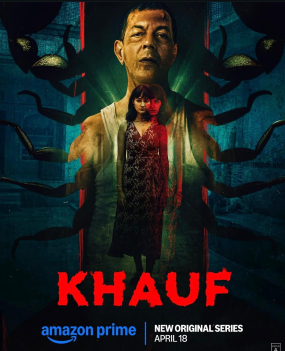Read the full review of Khauf (2025), a Hindi horror series streaming on Amazon Prime Video. Starring Monika Panwar, Rajat Kapoor, and Geetanjali Kulkarni, the show explores psychological fear, trauma, and supernatural suspense.

Genre: Horror | Language: Hindi | Platform: Amazon Prime Video
Creators: Smita Singh (Writer), Pankaj Kumar & Surya Balakrishnan (Directors)
Production House: Matchbox Shots
Starring: Monika Panwar, Rajat Kapoor, Abhishek Chauhan, Geetanjali Kulkarni, Shilpa Shukla, Chum Darang
Release Date: 18 April 2025 | Episodes: 8 | Duration: 43–50 minutes each
Introduction
Amazon Prime Video’s Khauf arrives at a time when Indian horror content is evolving beyond typical tropes of haunted houses and jump scares. With Matchbox Shots backing the production, and Smita Singh penning the script — known for her grounded writing — the expectations were high. Thankfully, Khauf doesn’t disappoint. It’s a slow-burning psychological horror series that blends fear with emotional complexity, grounded characters, and an unnerving sense of realism.
Plot Overview
Khauf (which translates to “Fear”) is not your standard ghost story. Instead of relying solely on supernatural elements, it delves deep into psychological horror, examining how fear manifests within families, communities, and individual psyches. Set in a remote North Indian town riddled with superstition, generational trauma, and buried secrets, the series follows a series of unexplainable events that begin to unravel after the mysterious death of a schoolteacher.
The narrative focuses on five interconnected characters — a grieving daughter (Monika Panwar), a cynical psychiatrist (Rajat Kapoor), a school principal (Geetanjali Kulkarni), a reclusive writer (Abhishek Chauhan), and a corrupt local politician (Shilpa Shukla) — each battling their own demons. Their paths cross as a sinister presence begins to manipulate reality, memory, and even time.
As the episodes unfold, the horror deepens — not in gore or bloodshed, but through growing paranoia, fractured relationships, and an inescapable atmosphere of dread.
Performances
Monika Panwar, last seen in gritty dramas like Jamtara, delivers a deeply affecting performance as a young woman mourning the loss of her mother while slowly unraveling mentally. Her character’s descent into fear feels both personal and universal, and she handles it with remarkable sensitivity.
Rajat Kapoor is a standout as Dr. Arvind, a psychiatrist who doesn’t believe in the supernatural yet finds himself face-to-face with something beyond comprehension. Kapoor brings his trademark gravitas to the role, anchoring many of the series’ most intense dialogues.
Geetanjali Kulkarni, known for her naturalistic acting style, plays the strict but haunted school principal with eerie conviction. Abhishek Chauhan and Shilpa Shukla add further depth and ambiguity, with Shukla portraying a morally grey character with both authority and inner terror.
Supporting actors like Chum Darang add much-needed dimension and diversity, contributing meaningfully to the narrative rather than serving as fillers.
Direction & Writing
The dual direction by Pankaj Kumar and Surya Balakrishnan is precise, subtle, and atmospheric. Unlike many horror series that rely on jump scares or loud background music, Khauf is a mood-based horror — one that creeps under your skin slowly.
Pankaj Kumar, who also handles the cinematography, ensures that every frame is drenched in mood — whether it’s a fog-covered field, a dimly lit corridor, or a shadow moving in the background. Visual storytelling plays a key role here, often letting silence and stillness do the talking.
Smita Singh’s writing deserves applause. She avoids clichés and instead leans into the psychological, emotional, and societal roots of fear. The script is layered with symbolism — mirrors, dreams, recurring motifs — and deftly explores themes like childhood trauma, mental illness, guilt, and societal repression. Every character has depth, and the horror often comes not from ghosts but from unresolved memories and personal choices.
Pacing & Structure
The eight-episode structure works in the series’ favor, offering enough space to explore characters and build a slow, steady tension. However, viewers used to fast-paced thrillers or conventional ghost stories may find the pacing deliberate and meditative. There are no quick resolutions here — answers are ambiguous, just like fear in real life.
Episodes often end on unsettling notes rather than cliffhangers, and while that might feel unsatisfying to some, it’s in line with the show’s tone. The final two episodes are particularly strong, tying together narrative threads without neatly explaining every mystery — a bold choice that works due to strong storytelling.
Sound Design & Music
The background score is minimalistic, using ambient noise, whispers, and eerie silences more than dramatic music. This understated sound design enhances the psychological element of horror. The sound of dripping water, a creaking door, or a distant scream is often more terrifying than a loud bang.
The title track, hauntingly composed, sets the tone for the series and stays with you long after.
Themes & Symbolism
Khauf explores the many faces of fear — fear of loss, fear of being forgotten, fear of guilt, and fear of confronting the truth. It doesn’t paint its characters in black and white. Everyone is flawed, carrying emotional baggage that the “haunting” merely brings to the surface.
There’s also a strong critique of societal repression, especially of women and mental illness, with the series subtly commenting on how society labels trauma as madness or superstition. The horror becomes a metaphor for what we choose to suppress.
Strengths
- Powerful, layered performances
- Richly atmospheric cinematography
- Subtle, intelligent writing
- Thought-provoking themes
- Deep psychological horror without clichés
Weaknesses
- Slow pacing may not appeal to everyone
- Ambiguous ending might frustrate viewers expecting clear closure
- Limited jump scares may disappoint traditional horror fans
Final Verdict:
BMR Rating: 4.2/5
Khauf is not a horror series for the faint of heart — not because of ghosts, but because it forces viewers to confront emotional truths and unresolved fears. It’s unsettling, mature, and artistically brave. If you’re tired of formulaic horror and want something that lingers in your mind long after the credits roll, Khauf is worth watching.